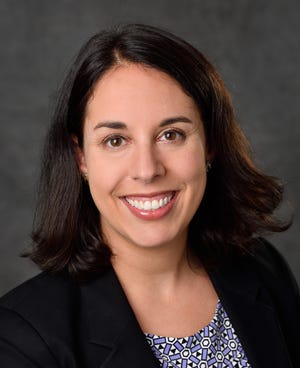Faculty voice: Remembering the Holocaust on Yom HaShoah
April 25, 2022 - Amy Simon, Ph.D.
Amy Simon is an assistant professor and holds the William and Audrey Farber Family Chair in Holocaust Studies and European Jewish History, participating in James Madison College, the Department of History in the College of Social Science and The Michael and Elaine Serling Institute for Jewish Studies and Modern Israel. Her research examines victim representations of perpetrators in Yiddish diaries written in the Warsaw, Lodz and Vilna ghettos during World War II. Simon is a recipient of MSU’s prestigious Teacher-Scholar Award.

A few months following the completion of my undergraduate studies, I began working at the United States Holocaust Memorial Museum (USHMM) in Washington D.C. The date I began is significant, September 10, 2001, as it preceded a lifechanging event: 9/11.
For months afterward, I awoke afraid and worried about the potential for a next terrorist attack; at the same time, I went to work in perhaps the most depressing building in the country. Being at the Museum during that time, however, became one of the most formative experiences of my life. In addition to learn important life lessons about coping with trauma and moving forward, I had some amazing experiences.
A particular highlight was attending the Days of Remembrance Ceremony, held in the United States Capitol Rotunda on April 9, 2002. This event occurs annually on Yom HaShoah (Holocaust Remembrance Day) and consists of a large gathering of Holocaust survivors and their families, notable political personalities, and USHMM staff. I was part of that staff.
Renowned author and Holocaust survivor, Elie Wiesel, was the headline speaker. I could not believe my good fortune, as a young college graduate, to have the opportunity to hear Mr. Wiesel speak. His words, as always, were significant and inspiring. Participating in that ceremony in that place with those people highlighted to me the importance the U.S. government afforded to Holocaust memory.
Since then, I have completed three higher degrees, culminating in a Ph.D. in history with a focus on the Holocaust. I regularly teach classes on the history of antisemitism and the Holocaust in American memory and regularly utilize many of the things I learned while at the USHMM. Especially, I recount my experiences there in 2001 and teach students about the history and ongoing commemoration of Yom HaShoah and its centrality in the American memorial landscape.
I teach about the creation of the memorial day by the Israeli government in 1951, which falls midway between the end of Passover and Israeli Independence Day and near the date of the Warsaw Ghetto Uprising, usually in April. I talk about the pressure American Jews felt in the 1960s to adopt the same date, despite the existence of other traditional Jewish days of mourning on the Hebrew calendar.
I explain that calendar, based on a lunar system, that counts this year as 5782 instead of 2022 and whose dates vary on our Gregorian calendar from year to year. In the past, I have asked students to investigate and report on Yom HaShoah commemorations throughout the country.
This year, however, everything seemed to change. I was highlighted as a College of Social Science “diversity champion” in January instead of April and asked to write a “viewpoint” on the importance of observing International Holocaust Remembrance Day, which falls every year on January 27, for the "Lansing State Journal."
In all my years teaching about the Holocaust, no one had ever asked for me to comment in January — I had always been invited to speak in accordance with the Israeli memorial date. Curious, I did some research and found that the United Nations ratified January 27 as the official international Holocaust remembrance day only in 2005. It commemorates the liberation of the Auschwitz labor and death camp by Soviet troops on that day in 1945.
Upon further research, it appears the two dates were initiated for different reasons, but with one unifying objective: Never forget. This is true especially today.
Though the events of the Holocaust ended almost eighty years ago, both the trauma of the survivors and continued acts of mass killing and genocide continue. When the UN ratified the “Convention on the Prevention and Punishment of the Crime of Genocide” in 1948, prompted by the mass murder of Armenians during World War I and the Holocaust, it would have been difficult to imagine the number of genocides that would fall under its purview in the years to come. Further, we are bombarded in the news every day of possibly genocidal killings in Ukraine, a country that has undergone more than its fair share of possibly genocidal killings in its recent history.
Among these horror stories are even some directly relevant to Yom HaShoah, of people who survived the Holocaust only to perish now under Russian attack, and of Zelenskyy’s own family history of Holocaust persecution. On April 28, 2022, this year’s Yom HaShoah, I hope everyone considers the legacy of the Holocaust for Jews, Jewish communities, and those experiencing mass murder today.

